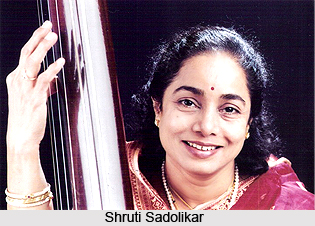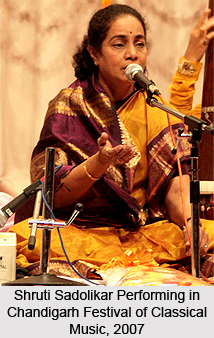 Shruti Sadolikar, the prominent Indian classical vocalist, is the proud daughter of the noted Indian classical musician Pandit Wamanrao Sadolikar who has been regarded as one of the protagonist of Jaipur Atrauli Gharana. Her induction to the arena of music started with the hands of her father. She has also received training in classical music under the guidance of her father. Shruti has also bagged the honour of being trained under the expert tutelage of Ustad Gulubhai Jasdanwala. Shruti Sadolikar is a singer of the Khayal Gharana.
Shruti Sadolikar, the prominent Indian classical vocalist, is the proud daughter of the noted Indian classical musician Pandit Wamanrao Sadolikar who has been regarded as one of the protagonist of Jaipur Atrauli Gharana. Her induction to the arena of music started with the hands of her father. She has also received training in classical music under the guidance of her father. Shruti has also bagged the honour of being trained under the expert tutelage of Ustad Gulubhai Jasdanwala. Shruti Sadolikar is a singer of the Khayal Gharana.
Early Life of Shruti Sadolikar
Shruti was born in the year 1951 in Kolhapur, Maharashtra, a city known for its musical tradition. She began learning music from a tender age and initially received training from her father. Afterwards she underwent a training period of over 12 years in music under the tutelage of Ustad Gulubhai Jasdanwala who was recognized for his vast raaga collection including the rare ones. During her training session she has tried to incorporate the rare authorships and complex raagas of the Gharana. Shruti Sadolikar holds a Masters Degree in Music from SNDT Women`s University in Mumbai and also completed "Sangeet Visharad" with distinction. She also wrote a thesis on `Haveli Sangeet` which is a kind of temple music.
Career of Shruti Sadolikar

Shruti Sadolikar has also bagged the honour of executing in all the highly esteemed `Sangeet Sammelans` in the country. She performed all forms of Indian classical music including thumri, tappa, and natya sangeet. She has performed in India, Canada, the United States, France, Switzerland, Germany and the West Asian countries. Acknowledging her talent she has been chosen as an "A" grade artist of Akashvani and Doordarshan. In the year 1999, Sadolikar shaped a play named "Sangeet Tulsidas" in which she gave the music. She also performed for SPIC MACAY to interest young Indians in Indian classical music. She has also published a number of musical and educational recordings. Sadolikar was a regular playback singer in Indian movies. She works as Vice Chancellor of the Bhatkhande Music Institute University in Lucknow, Uttar Pradesh. Even after establishing as a notable performer she used to receive training from Ustad Azizuddin Khan, who was the son of Bhurji Khan Saheb.
Achievements of Shruti Sadolikar
As recognition to her talent Sadolikar has been conferred countless awards. Apart from winning awards she has also fetched respective highly prestigious scholarships. Shruti Sadolikar has also bagged the esteemed Homi Bhabha fellowship from NCPA (National Centre for the Performing Arts). She has been conferred the Dagar Gharana Samman from the Maharana Mewar Foundation of Udaipur. She has exhibited many noteworthy performances; "Gayakee Raaga and Tala" is one amongst them. In this performance, Shruti has sung twenty raagas, to her credit, in over ten talas. She has also recorded two volumes of traditional thumris. In the year 2000, Shruti Sadolikar has been conferred the Shanmukha Sangeet Shiromoni Award. At the ITC Sangeet Research Academy, Shruti Sadolikar at this present moment serves as the Guru. In 2011 she has been honoured with the Sangeet Natak Akademi Award for Hindustani vocal music.




















